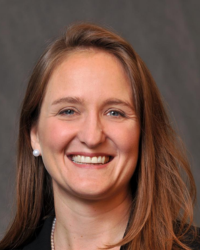Candidate Bio

Dr. Dallas Nelson is a Professor of Medicine at the University of Rochester. She did her residency and fellowship at the University of Rochester. Since 2005, Dr. Nelson work as a hospitalist, in a home visit practice, currently as a medical director, and physician in nursing home, assisted living and independent living. She became the medical director of the UR Medicine Geriatrics Group in 2012. The group consists of 16 physicians and 43 Advance practice providers serving 12 nursing homes and 33 senior living facilities as primary care providers and medical directors.
Her academic work focuses on education of the practicing provider and development of safe systems of care. Dr. Nelson is a regular speaker at the annual meeting. For her practice she developed a curriculum to bring cutting edge geriatric medicine to the providers and decrease unwarranted variation. The group meets on a monthly basis to review cases and articles. She helped to create a system of promoting the use of monoclonal antibodies by ensuring supply and sharing knowledge and resources across the Rochester community. Dr. Nelson facilitated a research project validating urgent telemedicine visits in the senior living communities. This research showed significant reductions in emergency department use. Currently she is working to promote specialist telemedicine visit in the nursing home setting. With West Health, she is an advisor on the creation and promotion of the Age Inclusive Telemedicine Principles.
AMDA-The Society for Post-Acute and Long-Term Care has been central to Dr. Nelson’s career development and work. The education committee was her introduction to AMDA committee from 2008-2019, and chair of the committee from 2016-2019. As part of the education committee, she helped to create the online QAPI curriculum and facilitate several workshops on QAPI. In 2016, she joined the American Board of Post Acute and Long-Term Care and was chair from 2021-2023. Currently, she has served on the Telemedicine Subcommittee since 2017 and chaired it since 2020 along with being a member of the State Based Policy Committee and the governance committee.
During the pandemic, Dr. Nelson became the president and chair of the New York Medical Directors Association from 2021-2023. In that role, she actively dialoged with the New York Department of Health and the regional QIO. As a result of her advocacy with the DOH, they ask if NYMDA would develop outreach to the New York nursing homes on the control and treatment of COVID-19. Dr. Nelson is currently the program director for the NYMDA COVID-19 Resource Project. The project provides coaching, tools, and guidance on the treatment and control of respiratory viruses in the nursing home setting.
Candidate Statement
Practicing in the post-acute and long-term care setting is difficult due to the complexity of residents, the resource constraints and extensive regulations. In order for me to tackle the challenge of providing good care in this vulnerable population, I needed help. AMDA-The Society of Post Acute and Long-Term Care (PALTC) provided much of the support I needed to provide care to this important population. My involvement in AMDA promoted my growth as a long-term care physician. In return, for AMDA’s support, I want to give back.
Out of fellowship, I was hired as a medical director. AMDA provided the needed education through the Core and CMD Certification. From the beginning I began serving AMDA through the Education committee. We created a curriculum to introduce Quality Assurance and Process Improvement as AMDA expanded the focus from medical directors to other provider types. These were topics that formal education does not provide. As a member of the board, I will work to help keep the education a priority.
PALTC can feel lonely. A provider is surrounded by administration and interdisciplinary professionals all with differing agendas. Being part of the large state and national organizations like AMDA provides support and a lifeline of like-minded individuals in order to reduce that isolation and prevent burnout. I believe that outreach to these providers is an important goal for this organization.
AMDA provides advocacy for fair compensation for its providers. During my membership with organization, I have grown in this space. I was privileges to be part of the Hill Day AMDA team for a couple of years, when we asked to remove arbitrary frequency of visit restrictions on telemedicine in the nursing home and for a medical director national registry. Over the last year, I started training on long term care billing through RUC committee advocacy. Learning the system for advocating for fair compensation for nursing home and long-term care providers is a long-term commitment for me.
Not only is advocacy important at a national level, it is also extremely important at a local level. I believe that the national society should continue to be a resource for local chapters. The COVID-19 pandemic put a spotlight on need for state-based advocacy. Our industry, due to the government payment and regulation, is sensitive to state policy. The Friday calls on state based COVID-19 policy highlighted what issues we needed to focus on and the arguments that we needed to make to state government officials. We wrote letters to and set up dialogs with the DOH. When I became the president of the New York Medical Directors Association, I wanted to get a seat at the table advocating for effective policy for the nursing home. After testifying at a state senate hearing, NYMDA was able to get regular meetings with our DOH. Out of NYMDA conversations and letter writing to the DOH, we were granted CDC Strikeforce funds. With those funds we have been able to set up a network of coaches, tools, and resources for the New York state nursing homes to help with the treatment and control of viral respiratory illness. None of these initiatives could have been possible without the guidance and support for NYMDA members by AMDA. I believe that one of the key strengths of our Society is our state chapters, which can influence state officials who have tremendous local impact.
As a member of the board of directors, my aim is to work to ensure the vitality of our Society. We need to extend our reach to other medical providers in the long-term care so they may benefit from the education and resources that AMDA provides. With the ultimate goal of providing the best care of our vulnerable residents, I will work toward AMDA providing the needed educational offerings that grow the needed skill for providing compassionate and state of the art care. I will assist the board in developing policy and advocacy at the local and national level efforts to provide sufficient resources to sustain the effort of the medical providers as well as the front-line staff in the long-term care continuum. If I am chosen to the Secretary to the Board of Directors, I will work to strengthen the Society that has already provided so much support to my career as a PALTC physician.

